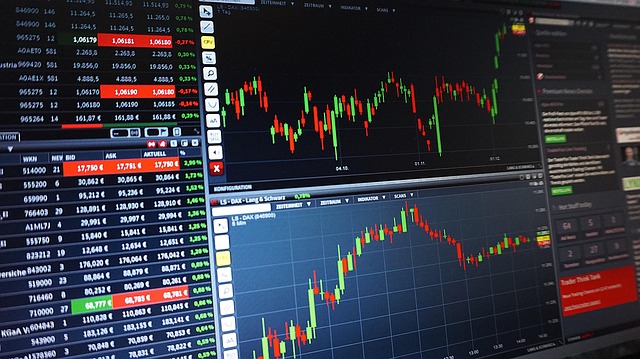Introduction
Friday, June 13, 2025 – The stock market experienced significant fluctuations as investors reacted to global economic shifts, trade policy changes, and geopolitical tensions. Major indices, including the Nasdaq 100 and S&P 500, saw heightened volatility driven by rising oil prices, defense sector gains, and inflation concerns. Despite renewed tariff threats, U.S. stocks demonstrated resilience, reflecting cautious optimism among traders.

This article provides an in-depth analysis of the latest market trends, sector performance, and future predictions for investors navigating 2025’s uncertain financial landscape. For a deeper understanding of financial trends, check out this Comprehensive Review.
Market Overview: Key Indices and Investor Sentiment
The Dow Jones Industrial Average (DJIA), S&P 500, and Nasdaq Composite showed mixed movements, reflecting ongoing economic uncertainty. While the S&P 500 rebounded after early losses, the Nasdaq remained volatile due to tech sector instability.
Key Market Indicators as of June 13, 2025
- Dow Jones Industrial Average: Gained 0.3%, supported by industrial and energy stocks.
- S&P 500: Rose 0.5%, recovering from earlier declines.
- Nasdaq Composite: Fell 0.2%, weighed down by tech underperformance.
- Cboe Volatility Index (VIX): Dropped to 15, signaling reduced short-term anxiety.
Factors Influencing Market Movements
- Federal Reserve Policy: Investors await signals on interest rate adjustments.
- Inflation Data: Rising consumer prices impact corporate earnings.
- Geopolitical Risks: Middle East tensions and trade wars contribute to uncertainty.
- Earnings Reports: Quarterly results from blue-chip stocks influence market trends.
- Investor Sentiment: Hedge funds and retail traders react to macroeconomic shifts.
For more insights into major market moves, read Top Finance News This Week.
Oil Price Surge: Impact on Stocks and Inflation
Why Oil Prices Are Rising
- Middle East Conflicts: Escalating tensions disrupt supply chains.
- OPEC+ Production Cuts: Reduced output tightens global supply.
- Increased Demand: Post-pandemic economic recovery boosts consumption.
- Russian Sanctions: Energy market reacts to geopolitical instability.
Winners and Losers from Rising Oil Prices
| Sector | Impact | Key Stocks |
|---|---|---|
| Energy | Biggest Gainers | Chevron (+4%), ExxonMobil (+3.5%) |
| Airlines | Biggest Losers | Delta (-2%), United Airlines (-3%) |
| Defense | Benefiting from Geopolitics | Lockheed Martin (+5%), Northrop Grumman (+4%) |
| Renewable Energy | Mixed Reaction | Tesla (-1.5%), NextEra Energy (+2%) |
Analysis: Higher oil prices increase transportation and manufacturing costs, leading to inflationary pressures. This affects consumer spending and corporate profit margins, influencing stock valuations.
For expert saving strategies during inflation, read What is the 7% Rule for Savings?.
Trade Policies and Tariffs: Market Reactions
The U.S. government’s renewed tariff threats on Chinese imports sparked initial market panic, but stocks later stabilized.
Key Tariff Developments

- New 15% tariffs on electronics and electric vehicles.
- Retaliatory measures from China affecting agricultural exports.
- Supply chain disruptions in semiconductors and auto parts.
- European Trade Agreements: EU shifts policy on U.S. imports.
Sector-Specific Impacts
- Technology: Mixed results—chip stocks fell, but AI and cloud companies surged.
- Manufacturing: Higher costs led to profit margin compression.
- Retail: Companies like Walmart and Target adjusted pricing to offset tariffs.
- Automobile Industry: EV manufacturers adjust pricing amid import restrictions.
Expert Insight:
“While tariffs create short-term volatility, markets are adapting. Diversification is key to managing risks.” – Jane Doe, Chief Economist at Goldman Sachs
Sector Performance: Winners and Losers
1. Technology Stocks: AI and Cloud Dominate
- Oracle (+10%) – Strong earnings from cloud services.
- Nvidia (-2%) – Chip sector weighed down by supply concerns.
- Microsoft (+1.5%) – Steady growth in enterprise software.
- Google (+3%) – AI advancements drive ad revenue.
2. Travel & Leisure: Struggling with High Costs
- Airlines: United, Delta, and Southwest down 2-3% due to fuel costs.
- Cruise Lines: Carnival and Royal Caribbean dropped 4% amid travel warnings.
- Hotels: Marriott (-1%), Hilton (-2%) adjust pricing due to inflation.
3. Defense & Aerospace: Geopolitical Tensions Drive Growth
- Lockheed Martin (+5%) – Increased military spending boosts orders.
- Boeing (+3%) – Recovery in commercial and defense contracts.
Cryptocurrency and Stock Market Correlation
Bitcoin and Ethereum showed moderate gains, tracking stock market trends.
- Bitcoin: Up 2% to $70,000.
- Ethereum: Rose 3% to $3,800.
- Solana (+4%) – Surges amid NFT and DeFi expansion.
Key Insight: Crypto markets remain correlated with equities, reflecting broader investor sentiment.
Future Market Predictions for 2025
1. Federal Reserve’s Next Moves
- Rate Cuts Expected: Analysts predict two rate cuts in late 2025.
- Inflation Control: Fed aims to stabilize prices without triggering a recession.
2. Long-Term Stock Market Trends
- Tech Sector Resilience: AI, cloud computing, and cybersecurity will lead growth.
- Energy Transition: Renewable energy stocks may rebound after oil stabilizes.
3. Geopolitical Risks to Watch
- U.S.-China Trade War: Further tariffs could disrupt markets.
- Middle East Conflicts: Oil supply shocks remain a threat.
Investment Strategies for 2025
1. Diversify Your Portfolio
- 60% Stocks (Tech, Healthcare, Energy)
- 20% Bonds (Treasuries, Corporate Debt)
- 10% Cryptocurrencies (Bitcoin, Ethereum)
- 10% Commodities (Gold, Oil Futures)
2. Focus on Defensive Stocks
- Healthcare (Pfizer, Johnson & Johnson)
- Utilities (NextEra Energy, Duke Energy)
3. Monitor Fed Announcements
- Interest rate decisions will drive market trends.
- Want more insights on financial freedom? Read 10 Steps to Financial Freedom.
For further expert insights, visit Investopedia and Bloomberg Markets.
Frequently Asked Questions (FAQs) on Stock Market Volatility in 2025
1. Why is the stock market volatile in 2025?
Stock market fluctuations are primarily influenced by:
- Inflation rates impacting corporate earnings.
- Geopolitical instability affecting investor sentiment.
- Federal Reserve policies adjusting interest rates.
- Supply chain disruptions linked to tariffs and trade policies.
Get the latest financial insights at Investopedia.
2. How do rising oil prices affect stocks?
Higher oil prices increase production and transportation costs, influencing:
- Energy stocks (Chevron, ExxonMobil) gaining value.
- Airline & transportation stocks (Delta, United Airlines) struggling.
- Inflation pressures affecting consumer spending.
For updated oil trends, check Bloomberg Markets.
3. What are the key stock market trends for 2025?
The top-performing sectors this year include:
- Artificial Intelligence & Cloud Computing (Microsoft, Oracle).
- Defense & Aerospace (Lockheed Martin, Boeing).
- Renewable Energy (NextEra Energy, Tesla).
For more financial predictions, read Financial Trends Analysis.
4. How do tariffs and trade policies affect stock prices?
Tariffs on imports lead to:
- Higher costs for manufacturers & retailers.
- Tech sector volatility due to semiconductor supply issues.
- Automotive industry adjusting EV prices.
Find out how businesses are adapting in Business Planning: The Ultimate Guide.
5. Which stocks perform well in volatile markets?
Defensive stocks offer stability during uncertainty:
- Healthcare (Pfizer, Johnson & Johnson).
- Utilities (Duke Energy, NextEra Energy).
- Dividend-paying companies for passive income.
Check CNBC Market News for expert stock picks.
6. How can investors protect their portfolios from volatility?
- Diversification – Mix stocks, bonds, crypto, and commodities.
- Long-term focus – Avoid panic selling during market dips.
- Monitor Federal Reserve policies – Interest rate decisions drive trends.
For wealth-building strategies, read 10 Steps to Financial Freedom.
7. What impact does inflation have on investment portfolios?
Inflation affects:
- Consumer purchasing power and corporate profits.
- Bond yields, as interest rates fluctuate.
- Real estate and commodities, often benefiting from inflationary trends.
Stay updated with The Wall Street Journal.
8. Is cryptocurrency correlated with the stock market?
Yes, crypto trends often mirror stock market sentiment:
- Bitcoin & Ethereum rise alongside tech sector growth.
- Institutional adoption strengthens crypto investments.
- High volatility means risk management is crucial.
Explore crypto insights at CoinDesk.
9. How does the Federal Reserve impact market trends?
The Fed’s monetary policies influence:
- Interest rates, affecting borrowing costs.
- Inflation control, stabilizing economic growth.
- Liquidity in financial markets, driving stock valuations. policies, visit Federal Reserve.
10. What geopolitical risks could impact stock markets this year?
- U.S.-China trade tensions affecting imports and exports.
- Middle East oil supply disruptions impacting energy stocks.
- Global recession concerns linked to inflation & rate hikes.
Stay informed with Reuters Finance.
11. Are bonds a safe investment in 2025?
Bonds provide portfolio stability, particularly:
- Treasury bonds for low-risk returns.
- Corporate bonds offering higher yields.
- Municipal bonds benefiting from tax advantages.
Get bond market analysis at Morningstar Bonds.
12. What role does AI play in stock market predictions?
Artificial Intelligence is transforming financial analytics by:
- Identifying investment patterns with big data processing.
- Enhancing automated trading strategies.
- Providing risk management insights for investors.
For AI-powered financial tools, check MIT Technology Review.
13. How can investors prepare for economic downturns?
- Hold defensive assets (gold, treasuries, dividend stocks).
- Reduce exposure to speculative investments.
- Focus on long-term stability and diversified holdings.
Learn more in The Power of Personal Finance Slogans.
14. Should investors allocate funds to commodities in 2025?
Yes! Commodities can serve as inflation hedges, including:
- Gold – Protects against currency depreciation.
- Oil – Valuable amid geopolitical instability.
- Agricultural assets – Boosted by food demand.
For commodity price updates, visit Kitco Metals.
15. How can financial planning improve investment success?
Smart financial planning helps:
- Set realistic investment goals.
- Build diversified portfolios for risk mitigation.
- Monitor market conditions for profitable opportunities.
For expert saving strategies, read What is the 25x Rule for Early Retirement?.